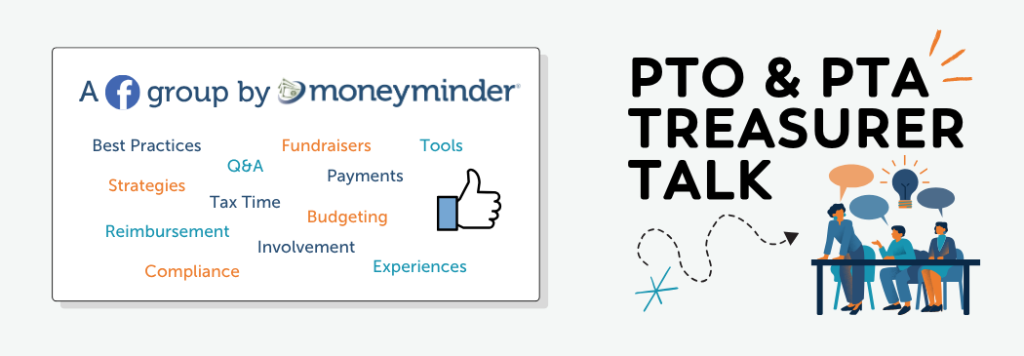So, you’ve just become the treasurer for your school’s PTO, PTA, or Booster Club. First of all — thank you! This is one of the most important volunteer roles in any school group. But if you’re feeling a little overwhelmed, you’re not alone. You might be thinking:
Where do I find everything?
How do I keep track of it all?
When does everything need to be done?
And what the heck is “everything,” anyway?
These are the exact questions most new treasurers ask themselves in the first few weeks. The good news? You don’t have to figure it all out alone.
Here are some of the most common challenges new treasurers face — and some simple tips to help you get started on the right foot.
1. Don’t go it alone
One of the biggest mistakes new treasurers make is trying to figure everything out by themselves. The good news? You’re part of a team.
Connect with the previous treasurer if possible. Schedule a meeting to receive any physical binders, supplies or documents they may have. Make a plan to pay any outstanding bills and change the bank signers.
You’ll find more tips for transitioning into the school group treasurer role in our Getting Started Guide.
2. Keep things organized from day one
Even if your group is small, there are a lot of moving pieces—events, reimbursements, deposits, reconciliations, reports. If you don’t stay on top of it, things pile up quickly.
A little organization now prevents a lot of stress later. Get all of your statements, receipts, vendor info, tax documents, supplies, binders, forms, and calendar sorted as soon as possible. This is a great guide to your first 30 days as treasurer.
Use a tool built for the job. MoneyMinder has just the features school group treasurers need, with support along the way. All subscriptions start with a free 30-day trial.
3. Get familiar with the budget
The budget is your roadmap. It helps you track the money coming in and going out, and keeps your group financially aligned.
When you step into the treasurer role, the budget may already be in place for the year, as some groups finalize it before the fiscal year ends. Or, it may still need to be finalized and approved.
In either case, make sure it’s approved by a vote early in the school year, and then reference it regularly to guide spending decisions and fundraising needs.
MoneyMinder’s free budgeting guide has more.
4. Be ready to communicate
You don’t need to be a public speaker, but you do need to plan on sharing financial information about your group clearly and regularly. Good communication promotes trust, accountability, and transparency — which are all essential for your group’s success.
- Present simple reports at your meetings. They don’t need to be fancy.
- Keep board members informed about budget status and major spending.
- Be responsive to reimbursement questions and fundraising updates.
Learn more about the treasurer’s report.
5. Know your due dates
The “invisible” work of a treasurer includes knowing key important compliance deadlines and not missing them. Depending on your group’s structure, this could include:
- Filing your 990 (for tax-exempt organizations)
- Renewing state registrations
- Maintaining insurance
- Licensure and other permits (i.e. charitable solicitation or movie license)
- Monthly or year-end reports
- Audits or financial reviews
Final Thoughts
Being a school group treasurer is a big job, but it’s also an incredibly rewarding one. You’re helping your school community run smoothly, support students, and make an impact — all while gaining skills that go beyond spreadsheets.
Remember, we’re here to help. As a customer, you’ll have access to our knowledgeable support team — made up of real volunteer treasurers who’ve been in your shoes.
Want to connect with others in the same boat? Join our Facebook Group, where hundreds of school group treasurers share advice, ask questions, and cheer each other on.

You’ve got this!
 Connect your Venmo account to MoneyMinder PRO to directly download transactions, saving you time and effort. You just review the transactions to ensure they are properly categorized and fill out any required fields.
Connect your Venmo account to MoneyMinder PRO to directly download transactions, saving you time and effort. You just review the transactions to ensure they are properly categorized and fill out any required fields. Connect your Bank, Square and PayPal accounts to MoneyMinder PRO to directly download transactions, saving you time and effort. You just review the transactions to ensure they are properly categorized and fill out any required fields.
Connect your Bank, Square and PayPal accounts to MoneyMinder PRO to directly download transactions, saving you time and effort. You just review the transactions to ensure they are properly categorized and fill out any required fields. Connect your Bank, Paypal and Square accounts to MoneyMinder PRO to directly download transactions, saving you time and effort. You just review the transactions to ensure they are properly categorized and fill out any required fields.
Connect your Bank, Paypal and Square accounts to MoneyMinder PRO to directly download transactions, saving you time and effort. You just review the transactions to ensure they are properly categorized and fill out any required fields. Connect your Bank, Paypal and Square accounts to MoneyMinder PRO to directly download transactions, saving you time and effort. You just review the transactions to ensure they are properly categorized and fill out any required fields.
Connect your Bank, Paypal and Square accounts to MoneyMinder PRO to directly download transactions, saving you time and effort. You just review the transactions to ensure they are properly categorized and fill out any required fields. Join It is a membership management service that helps businesses and nonprofits effectively sell, track, and grow their membership.
Join It is a membership management service that helps businesses and nonprofits effectively sell, track, and grow their membership.